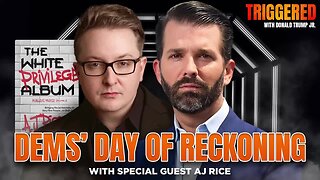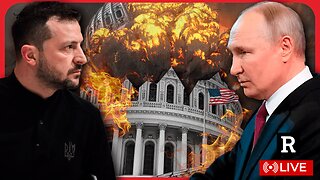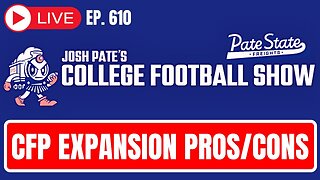Premium Only Content

Episode 1351: Council of Trent - Session 22 - Sacrifice of the Mass & Quo Primum
The Council of Trent, a significant ecumenical council of the Catholic Church, took place over several years, from 1545 to 1563. (18 years) During the council, there were several popes who served consecutively. The popes during the Council of Trent were:
Pope Paul III (1534-1549) 15 years but only 4 years on Trent: Pope Paul III convoked the Council of Trent in 1545. He initiated the council as a response to the Protestant Reformation and sought to address theological and disciplinary matters within the Church.
Pope Julius III (1550-1555) 5 years : Pope Julius III presided over a portion of the Council of Trent. His pontificate coincided with the later sessions of the council, and he played a role in its deliberations.
Pope Marcellus II (1555) less than a year: Pope Marcellus II became Pope for a brief period in 1555 but died just a few weeks after his election. He did not have a significant impact on the proceedings of the Council of Trent.
Pope Paul IV (1555-1559) 4 Years: Pope Paul IV was the pope during the later sessions of the Council of Trent. However, he did not actively participate in the council, and his pontificate was marked by other significant events and reforms.
Pope Pius IV (1559-1565) 6 Years: Pope Pius IV presided over the final sessions of the Council of Trent and brought the council to a close in 1563. He played a crucial role in implementing and promulgating the council's decrees.
So the ultimate question is whether Pope Pius V (1566-1572) did say that the traditional Mass as outlined by the Council of Trent could never be abrogated?
Yes he did. In his bull Quo Primum (From the First), he wrote:
The following are the key points of Session 22 of the Council of Trent on the Doctrine of the Sacrifice of the Mass:
1. The Mass is a true and propitiatory sacrifice.
2. The Mass is offered for the living and the dead.
3. The Mass has the power to obtain forgiveness of sins.
4. The Mass is not a blasphemy against the sacrifice of Christ on the cross.
5. The Mass is not a bare commemoration of the sacrifice on the cross.
6. The Mass is not only a sacrifice of praise and thanksgiving.
The Council of Trent's definition of the Mass was a major step in the Catholic Church's response to the Protestant Reformation. The council's teaching on the Mass has been reaffirmed by subsequent popes and councils, and it remains an important part of Catholic doctrine today.
The Mass is a true and proper sacrifice offered to God.
The Council of Trent's doctrine on the Sacrifice of the Mass is based on the belief that Christ's sacrifice on the cross was a perfect and complete offering to God.
In the Mass, the priest repeats the words that Christ spoke at the Last Supper: "This is my body, which is given for you. This is my blood, which is shed for you." When the priest says these words, the bread and wine are changed into the Body and Blood of Christ. This is called transubstantiation.
The Mass is therefore a true and proper sacrifice offered to God. It is not simply a commemoration of the sacrifice on the cross, but a real and propitiatory offering that makes satisfaction for sins and obtains graces for the living and the dead.
The Council of Trent's doctrine on the Sacrifice of the Mass is based on the following scriptural passages:
Matthew 26:26-28: "And as they were eating, Jesus took bread, and blessed, and brake it, and gave to the disciples, and said, Take, eat; this is my body. And he took the cup, and gave thanks, and gave it to them, saying, Drink ye all of it; for this is my blood of the new testament, which is shed for many for the remission of sins."
1 Corinthians 11:24-25: "And when he had given thanks, he brake it, and said, This is my body, which is for you: this do in remembrance of me. Likewise also the cup after supper, saying, This cup is the new testament in my blood: this do ye, as oft as ye drink it, in remembrance of me."
Hebrews 9:11-14: "But Christ being come an high priest of good things to come, by a greater and more perfect tabernacle, not made with hands, that is to say, not of this building; neither by the blood of goats and calves, but by his own blood he entered in once into the holy place, having obtained eternal redemption for us. For if the blood of bulls and of goats, and the ashes of an heifer sprinkling the unclean, sanctifieth to the purifying of the flesh: how much more shall the blood of Christ, who through the eternal Spirit offered himself without spot to God, cleanse your conscience from dead works to serve the living God?"
The Council of Trent's doctrine on the Sacrifice of the Mass is a rich and complex teaching. It is based on the Catholic Church's understanding of Scripture, tradition, and reason. It is a central part of Catholic belief and practice, and it is a source of great spiritual nourishment for Catholics around the world.
The Council of Trent's doctrine on the Sacrifice of the Mass is still held by the Catholic Church today. It is a central part of Catholic belief and practice, and it is a source of great spiritual nourishment for Catholics around the world. But the reason is because a Pope that followed the Council of Trent Pope Pius V thought Session 22 was so very important and being somewhat prophetic knowing this is where the devil would strike the church in the future issued Quo Primum 6 years after the council ended and 8 years after the writing of session 22 at the council.
Now lets go through the encyclical
Session 22 of the Council of Trent, which was held in 1562, (Pope defined the Catholic doctrine of the Mass. The council condemned the Protestant view that the Mass is only a symbolic commemoration of Christ's sacrifice on the cross, and it affirmed that the Mass is a true and propitiatory sacrifice. The council also taught that the Mass is offered for the living and the dead, and that it has the power to obtain forgiveness of sins.
Quo Primum
Promulgating the Tridentine Liturgy
Pope Pius V – 1570 (6 years after the Council of Trent)
APOSTOLIC CONSTITUTION
From the very first, upon Our elevation to the chief Apostleship, We gladly turned our mind and energies and directed all our thoughts to those matters which concerned the preservation of a pure liturgy, and We strove with God’s help, by every means in our power, to accomplish this purpose. For, besides other decrees of the sacred Council of Trent, there were stipulations for Us to revise and re-edit the sacred books: the Catechism, the Missal and the Breviary. With the Catechism published for the instruction of the faithful, by God’s help, and the Breviary thoroughly revised for the worthy praise of God, in order that the Missal and Breviary may be in perfect harmony, as fitting and proper – for its most becoming that there be in the Church only one appropriate manner of reciting the Psalms and only one rite for the celebration of Mass – We deemed it necessary to give our immediate attention to what still remained to be done, viz, the re-editing of the Missal as soon as possible.
Hence, We decided to entrust this work to learned men of our selection. They very carefully collated all their work with the ancient codices in Our Vatican Library and with reliable, preserved or emended codices from elsewhere. Besides this, these men consulted the works of ancient and approved authors concerning the same sacred rites; and thus they have restored the Missal itself to the original form and rite of the holy Fathers. When this work has been gone over numerous times and further emended, after serious study and reflection, We commanded that the finished product be printed and published as soon as possible, so that all might enjoy the fruits of this labor; and thus, priests would know which prayers to use and which rites and ceremonies they were required to observe from now on in the celebration of Masses.
Let all everywhere adopt and observe what has been handed down by the Holy Roman Church, the Mother and Teacher of the other churches, and let Masses not be sung or read according to any other formula than that of this Missal published by Us. This ordinance applies henceforth, now, and forever, throughout all the provinces of the Christian world, to all patriarchs, cathedral churches, collegiate and parish churches, be they secular or religious, both of men and of women – even of military orders – and of churches or chapels without a specific congregation in which conventual Masses are sung aloud in choir or read privately in accord with the rites and customs of the Roman Church. This Missal is to be used by all churches, even by those which in their authorization are made exempt, whether by Apostolic indult, custom, or privilege, or even if by oath or official confirmation of the Holy See, or have their rights and faculties guaranteed to them by any other manner whatsoever.
This new rite alone is to be used unless approval of the practice of saying Mass differently was given at the very time of the institution and confirmation of the church by Apostolic See at least 200 years ago, or unless there has prevailed a custom of a similar kind which has been continuously followed for a period of not less than 200 years, in which most cases We in no wise rescind their above-mentioned prerogative or custom. However, if this Missal, which we have seen fit to publish, be more agreeable to these latter, We grant them permission to celebrate Mass according to its rite, provided they have the consent of their bishop or prelate or of their whole Chapter, everything else to the contrary notwithstanding.
All other of the churches referred to above, however, are hereby denied the use of other missals, which are to be discontinued entirely and absolutely; whereas, by this present Constitution, which will be valid henceforth, now, and forever, We order and enjoin that nothing must be added to Our recently published Missal, nothing omitted from it, nor anything whatsoever be changed within it under the penalty of Our displeasure.
We specifically command each and every patriarch, administrator, and all other persons or whatever ecclesiastical dignity they may be, be they even cardinals of the Holy Roman Church, or possessed of any other rank or pre-eminence, and We order them in virtue of holy obedience to chant or to read the Mass according to the rite and manner and norm herewith laid down by Us and, hereafter, to discontinue and completely discard all other rubrics and rites of other missals, however ancient, which they have customarily followed; and they must not in celebrating Mass presume to introduce any ceremonies or recite any prayers other than those contained in this Missal.
Furthermore, by these presents [this law], in virtue of Our Apostolic authority, We grant and concede in perpetuity that, for the chanting or reading of the Mass in any church whatsoever, this Missal is hereafter to be followed absolutely, without any scruple of conscience or fear of incurring any penalty, judgment, or censure, and may freely and lawfully be used. Nor are superiors, administrators, canons, chaplains, and other secular priests, or religious, of whatever title designated, obliged to celebrate the Mass otherwise than as enjoined by Us. We likewise declare and ordain that no one whosoever is forced or coerced to alter this Missal, and that this present document cannot be revoked or modified, but remain always valid and retain its full force notwithstanding the previous constitutions and decrees of the Holy See, as well as any general or special constitutions or edicts of provincial or synodal councils, and notwithstanding the practice and custom of the aforesaid churches, established by long and immemorial prescription – except, however, if more than two hundred years’ standing.
It is Our will, therefore, and by the same authority, We decree that, after We publish this constitution and the edition of the Missal, the priests of the Roman Curia are, after thirty days, obliged to chant or read the Mass according to it; all others south of the Alps, after three months; and those beyond the Alps either within six months or whenever the Missal is available for sale. Wherefore, in order that the Missal be preserved incorrupt throughout the whole world and kept free of flaws and errors, the penalty for nonobservance for printers, whether mediately or immediately subject to Our dominion, and that of the Holy Roman Church, will be the forfeiting of their books and a fine of one hundred gold ducats, payable ipso facto to the Apostolic Treasury. Further, as for those located in other parts of the world, the penalty is excommunication latae sententiae, and such other penalties as may in Our judgment be imposed; and We decree by this law that they must not dare or presume either to print or to publish or to sell, or in any way to accept books of this nature without Our approval and consent, or without the express consent of the Apostolic Commissaries of those places, who will be appointed by Us. Said printer must receive a standard Missal and agree faithfully with it and in no wise vary from the Roman Missal of the large type (secundum magnum impressionem).
Accordingly, since it would be difficult for this present pronouncement to be sent to all parts of the Christian world and simultaneously come to light everywhere, We direct that it be, as usual, posted and published at the doors of the Basilica of the Prince of the Apostles, also at the Apostolic Chancery, and on the street at Campo Flora; furthermore, We direct that printed copies of this same edict signed by a notary public and made official by an ecclesiastical dignitary possess the same indubitable validity everywhere and in every nation, as if Our manuscript were shown there. Therefore, no one whosoever is permitted to alter this notice of Our permission, statute, ordinance, command, precept, grant, indult, declaration, will, decree, and prohibition. Would anyone, however, presume to commit such an act, he should know that he will incur the wrath of Almighty God and of the Blessed Apostles Peter and Paul.
Given at St. Peter’s in the year of the Lord’s Incarnation, 1570, on the 14th of July of the Fifth year of Our Pontificate.
-
 48:44
48:44
Man in America
14 hours agoA MASSIVE Global Financial Reset Is Coming—Are You Ready?
45.3K22 -
 1:15:42
1:15:42
Precision Rifle Network
1 day agoS4E5 Guns & Grub - The Best Rifle Under $2000
77.9K8 -
 1:02:54
1:02:54
Glenn Greenwald
1 day agoSouth Korean Economist Ha-Joon Chang on the Economic World Order, Trump's Tariffs, China & More | SYSTEM UPDATE #410
94.3K52 -
 1:02:27
1:02:27
Donald Trump Jr.
14 hours agoBye Mitch, plus Kash confirmed, Interview with AJ Rice | Triggered Ep.218
138K77 -
 1:12:27
1:12:27
The Amber May Show
16 hours ago $3.52 earnedWomen Of Rumble 02-20-25
40.8K8 -
 41:18
41:18
Kimberly Guilfoyle
14 hours agoToday, We Kash in on Equal Justice, Live with Ryan Walters & Daniel Turner | Ep.198
102K23 -
 1:36:50
1:36:50
Redacted News
13 hours agoThe TRUTH in Ukraine has been EXPOSED by Trump and they are melting down | Redacted w Clayton Morris
143K233 -
 2:05:35
2:05:35
The White House
14 hours agoPresident Trump Hosts a Reception Honoring Black History Month
90.1K45 -
 1:05:09
1:05:09
Josh Pate's College Football Show
14 hours ago $1.18 earnedCFP Expansion: Latest Intel | CFB’s Schedule Problem | Arch Manning Hype | ACC Program Rankings
33.7K5 -
 55:52
55:52
LFA TV
1 day agoTrump vs. Europe | TRUMPET DAILY 2.20.25 7PM
43.9K8